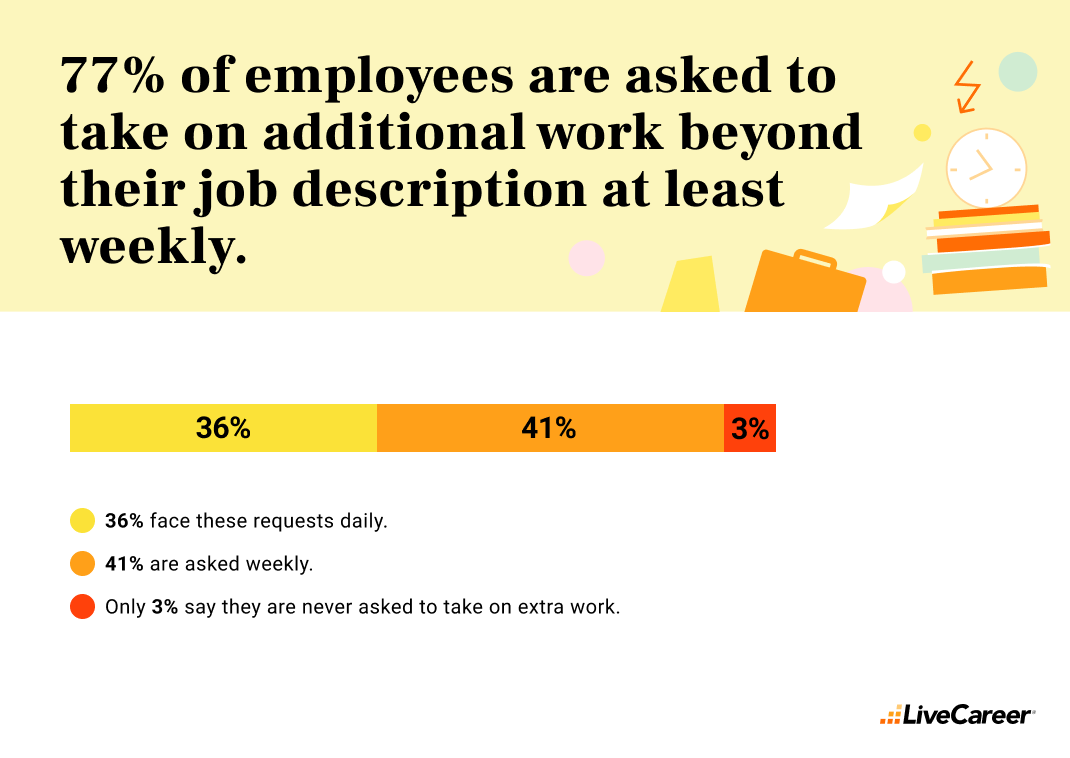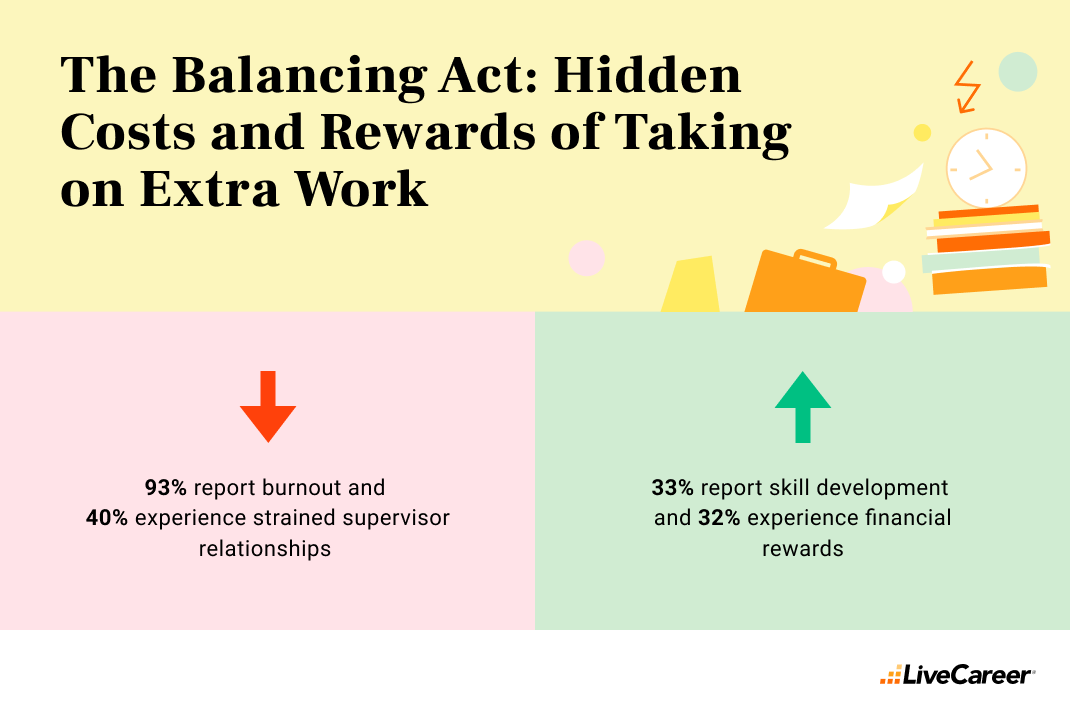LiveCareer Survey Finds 77% of Workers Take on Extra Duties Weekly; 93% Say It Leads to Burnout
Taking on extra work might earn brownie points with the boss or even boost a career, but it’s not always a win-win. LiveCareer’s Hidden Costs and Rewards of Extra Work Report uncovers what’s really happening behind the scenes when employees say “yes” to more work.
With 77% of employees taking on tasks outside their job descriptions weekly and 93% reporting burnout, it’s clear the extra load isn’t without consequences. Based on a December 2024 survey of 1,160 U.S. workers, the report uncovers the challenges workers face, from burnout to difficulty managing workload expectations, while also shedding light on the positive outcomes some workers experience.
Survey highlights:
- 77% of employees are asked to take on additional work beyond their job description at least weekly.
- 93% of employees experience burnout from taking on extra work.
- Only 11% say they negotiate or set boundaries.
- Strained relationships with supervisors (40%) and reduced productivity (37%) are the top negative outcomes.
- Skill development (33%) and financial rewards (32%) are the top cited benefits.
The Prevalence of Extra Work
Extra tasks are a reality for most employees, with the majority of workers saying they are regularly asked to perform work that falls outside of their job descriptions on a weekly basis.
- 77% of employees are asked to take on additional work beyond their job description at least weekly.
- 36% face these requests daily.
- 41% are asked weekly.
- Only 3% say they are never asked to take on extra work.
What this means: Most employees are frequently asked to perform tasks beyond their job descriptions, with over a third facing these requests daily. Extra work has become a regular expectation, leaving little room for employees to focus solely on their defined roles.
Burnout Is Widespread
The majority of workers experience burnout as a direct result of taking on additional responsibilities.
- 93% of employees experience burnout from taking on extra work.
- 59% frequently feel burned out from not saying no to extra responsibilities.
- 34% occasionally experience burnout due to taking on extra work.
What this means: The overwhelming majority of workers experience burnout due to additional responsibilities, highlighting the mental and emotional toll of consistently taking on more than they can handle.
Reactions to Requests for Extra Work
When asked to take on extra tasks, most employees feel pressured to say yes, even when it may conflict with their workload or personal boundaries.
- 56% of employees feel pressured and agree reluctantly to additional tasks.
- 30% accept extra work willingly.
- Only 11% set boundaries and say no to extra responsibilities.
- Just 3% decline requests.
What this means: Most employees feel compelled to accept extra tasks, often reluctantly, while only a small percentage set boundaries or decline requests. This reflects a workplace trend where saying “no” is rare, even when workloads become overwhelming.
Why Employees Say Yes
Employees take on additional responsibilities for various reasons, often driven by external pressures or personal ambitions.
- 27% cite pressure from managers or leadership.
- 24% want to seek recognition or stand out.
- 23% aim to be team players.
- 18% are motivated by career advancement opportunities.
- 8% admit they do not know how to decline extra work.
What this means: Employees agree to extra work due to a mix of external pressures and personal ambitions, with many seeking recognition or career advancement. This suggests that saying “yes” is often motivated by a desire to stand out or meet expectations, even at a personal cost.
Sources of Extra Work
Requests for additional tasks come from a variety of sources:
- 23% from direct managers.
- 22% from senior leaders or vice presidents.
- 22% from coworkers.
- 21% from managers of other teams.
- 13% from HR departments.
What this means: Requests for additional tasks come from all levels of the workplace, not just direct managers, indicating a widespread reliance on employees to fill gaps and take on responsibilities beyond their roles.
Types of Extra Work Assigned
The additional responsibilities employees are asked to take on span a wide range of tasks, often extending beyond their core job functions. Employees reported being asked to take on:
- 37% planning or coordinating workplace events.
- 37% administrative duties.
- 34% of tasks are typically handled by another department.
- 32% overtime.
- 29% of tasks are from unfilled positions.
- 28% mentoring or training colleagues.
- 28% covering for absent coworkers.
What this means: The additional tasks employees handle often fall outside their core responsibilities, such as event planning, administrative work, or covering for absent coworkers, pointing to an ongoing trend of role-stretching in the workplace.
Positive Outcomes
While taking on extra work presents challenges, many employees recognize significant benefits that can contribute to their personal and professional growth. These outcomes highlight how additional responsibilities, when managed effectively, can create valuable opportunities:
- 33% report skill development as a key benefit.
- 32% experience financial rewards like bonuses or raises.
- 31% form closer relationships with colleagues.
- 31% see opportunities for career advancement.
What this means: Despite the challenges, extra responsibilities can provide meaningful benefits, such as skill development, financial rewards, and stronger workplace relationships, showing that adding additional work isn’t always a losing game.
Negative Outcomes
However, employees face significant drawbacks when taking on extra work, particularly with their supervisor relationships and productivity levels:
- 40% experience strained relationships with supervisors.
- 37% report reduced productivity.
- 34% feel lower job satisfaction.
- 32% are concerned about setting unrealistic expectations for future performance.
What this means: The downsides of extra work are significant, with strained supervisor relationships, reduced productivity, and lower job satisfaction among the key consequences, suggesting that these tasks often come at a high cost to employees’ well-being.
Perceptions of Fairness and Compensation
Many employees view their extra responsibilities as essential to organizational success, with most feeling adequately rewarded for their efforts. However, perceptions of fairness and the benefits of extra work vary significantly across age groups:
- 56% of employees believe the extra work they take on is critical to the business’s success.
- 90% feel fairly compensated for their additional tasks.
- Older workers (41+) are more likely to perceive task distribution as fair (75%) compared to younger workers (25 or younger, 35%).
- Older workers (36%) are the most likely to see career advancement as a positive outcome, while younger workers (19%) are less likely to experience the same benefit.
What this means: While most employees feel fairly compensated for their extra work, perceptions of fairness and the benefits of additional responsibilities vary significantly by age, with older workers feeling more positive about the experience than younger ones.
The Hidden Costs and Rewards of Extra Work Report reveals a complex picture of workplace dynamics, where taking on additional responsibilities can lead to both significant challenges and meaningful benefits. While 93% of employees report burnout, others recognize opportunities for skill development, financial rewards, and career advancement.
For press inquiries, please contact Nathan Barber at nathan.barber@bold.com.
Methodology
The findings provided were gathered through a survey conducted with 1,160 American workers on December 3, 2024. Participants were asked to share their feelings on how saying “no” to additional responsibilities impacts their personal lives and mental health by responding to various question types, including yes/no questions, open-ended questions, scale-based questions gauging agreement levels, and questions that permitted the selection of multiple options from a list of answers.
About LiveCareer
LiveCareer’s online Resume Builder is designed to empower its users to get better jobs and improve their job search. A one-stop shop among AI resume builder tools, LiveCareer features cutting-edge resume templates, a powerful cover letter builder, and extensive free career resources to support job candidates in reaching their professional goals. Trusted by over 10 million users around the world, LiveCareer has been publishing expert advice from Certified Professional Resume Writers since 2005. LiveCareer’s career tips have been featured in renowned media outlets, including Bloomberg, Forbes, and Newsweek. Stay connected with LiveCareer’s latest updates to improve your job search on Facebook, Instagram, LinkedIn, and X.








